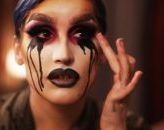
Voguing and the ballroom scene of Harlem have created cultural ripples through the decades and across continents. It has been appropriated, reassembled, packaged, sold and on many occasions sold out. Madonna was one of the first mainstream artists to acknowledge it in a very visible way but there are shards of its impact on many different styles in fashion, music and dance.
‘Deep in Vogue’ is the most recent iteration outlining the impact of voguing on the contemporary club scene in Manchester.
The first half of this 60 minute documentary lands awkwardly. It starts by the UK cast trying to explain what vogueing meant to the disenfranchised black gays of Harlem. It is too borrowed. Footage from the actual Harlem ballroom scene with its racial politics, unique dance moves, and gender fluidity works harder and is more compelling. The first voices announce a distance between their background as story tellers and the content that feels inauthentic at worst or redundant at best.
‘Deep in Vogue’ is an easy target to talk about cultural appropriation but it is much more interesting when you decide to flip the lens. The real story here is how Manchester has always taken influences from around the world, remixed them and added its own northern grit. Musician Ben Onono (of Welsh and Nigerian heritage) recently said that “Cultural appropriation is to creativity what free speech is to democracy, at times inappropriate and unsavoury but essential all the same”.
From a Manchester perspective the documentary has a visible and vocal presence of people who are of mixed racial backgrounds. In the UK a large percentage of people who identify as ‘non- white’ have one parent who is white. This itself contributes to a very distinct difference from the African American roots of vogue.
The wider aesthetics (the look of the shows and even of the documentary itself) owe as much to the conventions and formats of Britain’s Got Talent as they do to a Harlem ballroom.
The influence of the 90s Manchester club scene is inescapable. Clubs like Flesh, Paradise Factory etc were seminal in bringing together gays and straights under a veneer of fashion and debauchery. In this very Manchester version of vogueing you have white, straight cisgendered women duck walking, dipping and dropping along with transwomen, gay men and the non-binary.
Where the documentary most makes you think is the ease with which it brings in politics – in a Manchester way. If American politics is built on race then Manchester politics is built on class. The participants eagerly articulate that the appeal for them of vogueing is its sense of socialism. It is about sharing resources and skills horizontally and vertically so that ‘each person is lifted up and allowed to shine’
And the subjects of this documentary do shine. All ready to earn the spotlight not steal it. There are no shrinking violets on runways. Coming from a world where every day people on the street just stop and ‘laugh at you for being who you are’ you either stay home or go out and force the audience to love you. If you can embrace the second half of this documentary as the continual reinvention of Manchester rather than the dilution of Harlem then you are going to be treated to some good nights out, fun costumes and fierce looks. And a little bit of socialism

